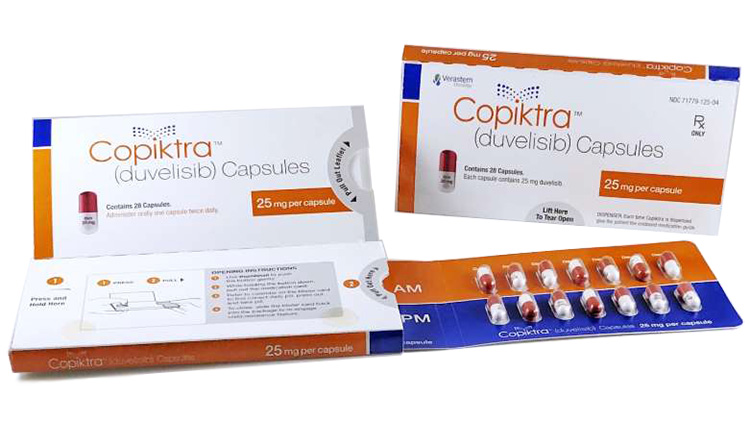Copiktra (duvelisib) vs Vanflyta (quizartinib)
Copiktra (duvelisib) vs Vanflyta (quizartinib)
Copiktra (duvelisib) is a dual inhibitor of phosphoinositide 3-kinase (PI3K)-delta and PI3K-gamma, used primarily for the treatment of certain types of chronic lymphocytic leukemia (CLL), small lymphocytic lymphoma (SLL), and follicular lymphoma. Vanflyta (quizartinib), on the other hand, is a tyrosine kinase inhibitor that specifically targets FLT3 (FMS-like tyrosine kinase 3) and is used for the treatment of adults with relapsed or refractory acute myeloid leukemia (AML) with a FLT3 mutation. The choice between Copiktra and Vanflyta would depend on the specific type of blood cancer a patient has and whether there is a presence of the FLT3 mutation in the case of AML, as each medication is targeted towards different pathways and indications.
Difference between Copiktra and Vanflyta
| Metric | Copiktra (duvelisib) | Vanflyta (quizartinib) |
|---|---|---|
| Generic name | duvelisib | quizartinib |
| Indications | Chronic lymphocytic leukemia (CLL), small lymphocytic lymphoma (SLL), and follicular lymphoma (FL) | Relapsed or refractory acute myeloid leukemia (AML) with FLT3-ITD mutation |
| Mechanism of action | Phosphoinositide 3-kinase (PI3K) inhibitor | Tyrosine kinase inhibitor (TKI) targeting FLT3 |
| Brand names | Copiktra | Vanflyta |
| Administrative route | Oral | Oral |
| Side effects | Diarrhea, neutropenia, rash, fatigue, pyrexia, cough, nausea, upper respiratory infection, pneumonia, musculoskeletal pain | QT interval prolongation, nausea, thrombocytopenia, diarrhea, vomiting, muscle pain, pneumonia, febrile neutropenia, dyspnea, edema |
| Contraindications | History of severe allergic reactions to duvelisib or any of its components | Patients with long QT syndrome, those on antiarrhythmic drugs, and other medications that prolong the QT interval |
| Drug class | PI3K inhibitor | FLT3 inhibitor |
| Manufacturer | Secura Bio, Inc. | Daiichi Sankyo |
Efficacy
Efficacy of Copiktra (Duvelisib) in Treating Leukemia
Copiktra (duvelisib) is a small molecule inhibitor of phosphoinositide 3-kinase (PI3K) and has been approved by the U.S. Food and Drug Administration (FDA) for the treatment of adult patients with relapsed or refractory chronic lymphocytic leukemia/small lymphocytic lymphoma (CLL/SLL) and follicular lymphoma (FL). Its efficacy in leukemia, particularly CLL/SLL, has been demonstrated in clinical trials. In the DUO trial, a pivotal phase III study, duvelisib significantly improved progression-free survival (PFS) compared to ofatumumab in patients with relapsed or refractory CLL/SLL. The median PFS for patients treated with duvelisib was 13.3 months versus 9.9 months for those receiving ofatumumab, indicating a clinically meaningful improvement.
However, it is important to note that the efficacy of Copiktra must be balanced against its safety profile, as the treatment is associated with serious and potentially fatal toxicities such as infections, diarrhea or colitis, cutaneous reactions, and pneumonitis. Therefore, the decision to use Copiktra should be based on a careful consideration of the individual patient's condition and the potential risks and benefits of the therapy.
Efficacy of Vanflyta (Quizartinib) in Treating Leukemia
Vanflyta (quizartinib) is a potent and selective FLT3 inhibitor that has shown efficacy in the treatment of acute myeloid leukemia (AML) with FLT3-ITD mutations, a subgroup of AML associated with a poor prognosis. The efficacy of quizartinib was evaluated in the QuANTUM-R study, which was a pivotal phase III trial. In this study, quizartinib monotherapy resulted in a significant improvement in overall survival compared to salvage chemotherapy in patients with relapsed or refractory AML with FLT3-ITD mutations. The median overall survival was 6.2 months for patients treated with quizartinib compared to 4.7 months for those receiving salvage chemotherapy.
Despite its demonstrated efficacy, quizartinib is not without its challenges. The treatment can be associated with side effects such as QT interval prolongation, which can lead to torsades de pointes or sudden death, and myelosuppression. As with Copiktra, the use of Vanflyta should involve a thorough evaluation of the patient's specific situation and a comprehensive discussion of the potential benefits and risks associated with its use. It is also important to monitor patients closely for adverse reactions during treatment with quizartinib.
Regulatory Agency Approvals
Copiktra
-
European Medical Agency (EMA), European Union

-
Food and Drug Administration (FDA), USA

Vanflyta
-
European Medical Agency (EMA), European Union

-
Food and Drug Administration (FDA), USA

Access Copiktra or Vanflyta today
If Copiktra or Vanflyta are not approved or available in your country (e.g. due to supply issues), you can access them via Everyone.org.
How it works

Make an enquiry
Choose the medicine you want to buy, answer a couple of questions, and upload your prescription to speed things up. We’ll get back to you within 24 hours.


Make an enquiry
Choose the medicine you want to buy, answer a couple of questions, and upload your prescription to speed things up. We’ll get back to you within 24 hours.


Breeze through the paperwork
We'll guide you through the required documents for importing unapproved medicine, ensuring you have all the necessary information.


Get a personalized quote
We’ll prepare a quote for you, including medicine costs and any shipping, administrative, or import fees that may apply.


Receive your medicine
Accept the quote and we’ll handle the rest - sourcing and safely delivering your medicine.

Some text on this page has been automatically generated. Speak to your physician before you start a new treatment or medication.
Let's talk
If you have any questions, call us or send us a message through WhatsApp or email:
Contact us




